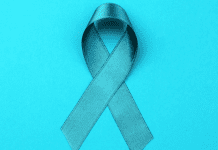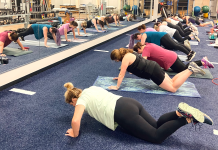 As a kid, whenever I overheard my mom talking about someone getting a hysterectomy, I thought of it as an “old lady” surgery. I certainly never thought it was something I would ever need done — it was just for women with lady issues! How naïve we are as children thinking we’ll never have the same issues as the older generations.
As a kid, whenever I overheard my mom talking about someone getting a hysterectomy, I thought of it as an “old lady” surgery. I certainly never thought it was something I would ever need done — it was just for women with lady issues! How naïve we are as children thinking we’ll never have the same issues as the older generations.
Birthing each of my kids presented separate problems and since my final kid resulted in a c-section, we decided to remove my fallopian tubes while I was open on the table. We knew we were done procreating, and this would prevent another future procedure for either of us. Between two vaginal births, one c-section, fallopian tubes removal and severe back issues, I found myself in that “old lady with female issues” stage by age 37, talking to my OBGYN about removing my prolapsed uterus and suspending my cervix up with a piece of mesh connected to my tailbone (called a sacrocolpopexy), followed by eight weeks of recovery.
Two years later we went through with it.
I quickly learned that age 42 is the average age of women who get hysterectomies, and they happen very often and for many different reasons. The following is my own personal experience based on my body’s issues and using my specific doctor/surgeon. Those getting a full hysterectomy or getting hysterectomies for other reasons may have differing pre-op expectations, post-op outcomes and doctor requests.
Obviously, all doctors who do this surgery have their own way of handling it, but mine required a bladder test before I could even get on the surgery schedule. If you’re ever asked to go in for a bladder test, leave all your modesty at the door. It is extremely awkward. Just accept it.
Five days before the surgery, I had to start inserting a vaginal cream each night at bedtime and the day before surgery, I had to start a colon cleanse – clear liquids for all meals, Miralax and Reglan. The night before surgery, I had to give myself not one but two enemas, take a normal shower and then a hibicleanse shower, sleep, and then get up and give myself another shower and hibicleanse shower before leaving for the early morning surgery time. Note I also had to use clean towels, wear clean pajamas and sleep on clean sheets.
Once there, you’re prepped like any surgery and then you’re given the happy juice, so you have no awareness until you wake up groggy and sore. Surgery length is usually 1-2 hours and most people are kept in the hospital for one night, but there are situations where you get to go home same day. My specific surgery was done robotically through the belly so while nothing was done vaginally or invasively, I’m left with five small scars across my abdomen. Stitches are covered in skin glue and eventually dissipate.
Recovery was not easy the first three weeks and you’re expected to follow many rules regarding lifting (nothing over 5 lbs.), exercise (walking only) and general self-care for a full eight weeks. This also includes no sitting on bikes, no tampons, no sex or strenuous activities for eight weeks. It was definitely helpful to wait until I was past the stage of holding littles, lifting carseats and pulling strollers out of the trunk. I also chose to do this during summer when I wouldn’t have a school schedule to abide by. Those who work should also plan to take at least one week off. Most are given prescription painkillers so I was not able to drive for about a week as well.
A few things I noticed in the weeks following surgery:
- It ached every time I urinated. A dull ache right behind my pubic bone. This lasted about eight weeks.
- Spotting. This can still occur once a month for possibly a year, but it’s minimal.
- Varying bowel movements for several weeks. Diarrhea and constipation — can’t make up its mind.
- First few days after surgery, it’s very hard to cough or laugh and you’ll be hunched over. Plan on bed rest for several days.
- If you get to a day you finally feel better, don’t get too excited and start doing stuff. I did this, and it set me back the next several days.
- You obviously can’t sleep on your belly and sleeping on my sides was uncomfortable because it felt like I could feel my organs shifting and piling up on the side I was laying on. This left back sleeping which I also don’t like. General discomfort.
- I would sometimes feel something moving around inside me, similar to when a baby would move around during pregnancy. I had to remind myself I wasn’t pregnant.
- Crazy itchiness around the labia.
- Around day 12 post-op, it felt like a brick was sitting in my abdomen.
- Gas pains were way more painful than usual.
- I had post-op visits at two weeks, six weeks and 16 weeks.



















